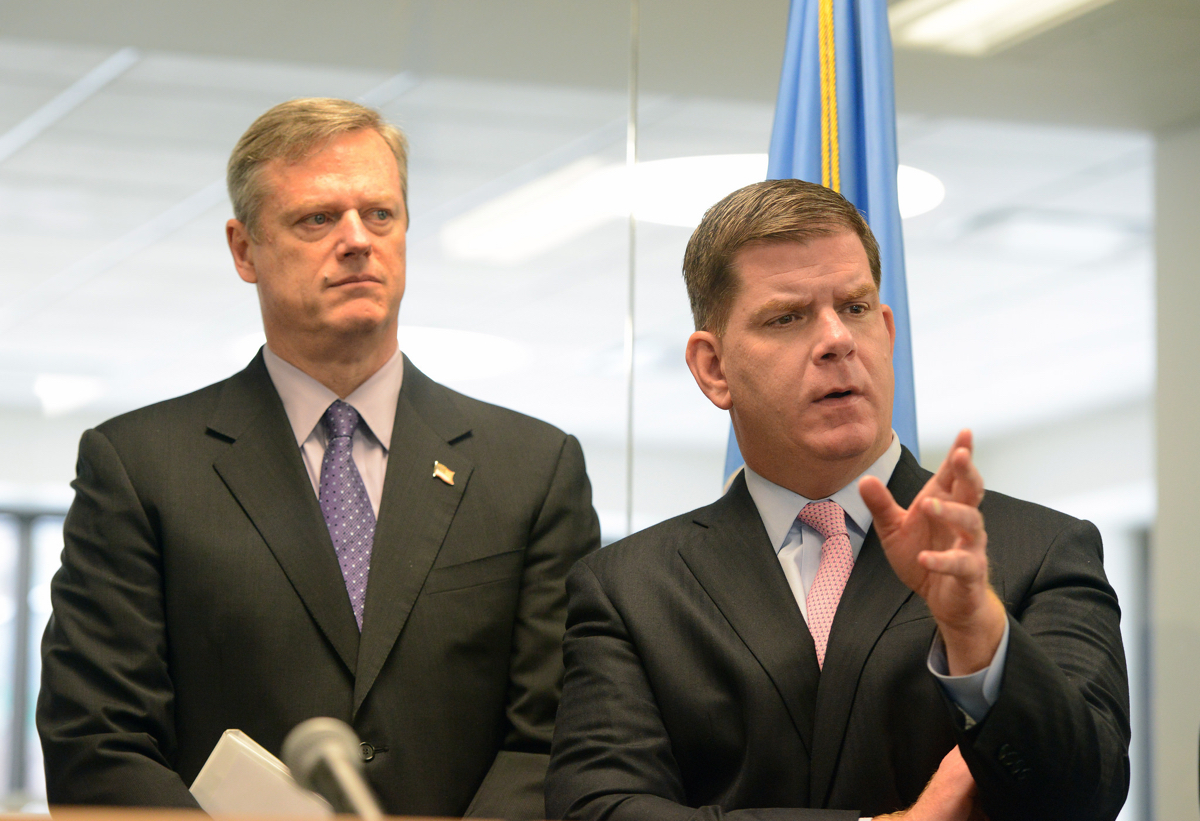Walsh, Baker Kick Off Anti-Legalization Campaign

Photo by Isabel Leon/Mayor’s Office
A bipartisan team of opponents to the bid to legalize marijuana in Massachusetts made their case against a pro-pot ballot question Friday, kicking off a campaign that will continue until the election in November.
Republicans Gov. Charlie Baker and Lt. Gov. Karyn Polito joined Democrats Mayor Marty Walsh, House Speaker Robert DeLeo, and Suffolk County Sherriff Steve Tompkins for the official launch of the Campaign for a Safe and Healthy Massachusetts at William Ostiguy Recovery High School.
The choice of venue, a classroom in an alternative school for students in addiction recovery, speaks to the two main arguments against recreational marijuana that opponents will use to try to quash the referendum this year: that legalization puts young people at risk and that the state’s ongoing opioid abuse epidemic is evidence we shouldn’t make access to other drugs easier.
“This is a very personal issue. I’ve been in the recovery community myself for over 20 years,” Walsh said at the news conference. “Alcohol got me into that community, but for a lot of other people, smoking marijuana started that journey into addiction.”
Baker argued that legalization would be a step backward after recent efforts to cut down on opioid abuse by curbing the amount of painkillers prescribed by doctors.
“People didn’t fully appreciate the addictive nature of those painkillers at the time, and we are waking up today some 10 or 15 years later, and trying desperately to put the genie back in the bottle,” Baker said. “I worry to some extent that we may be heading down a similar path when we talk about legalizing recreational marijuana and all of the product configurations that come with that.”
Walsh, Baker, and Attorney General Maura Healey made those assertions earlier this year in a co-written Boston Globe op-ed in March (it was actually a group effort of their staffs). Marijuana is a gateway drug, they said, and would strain the resources of hospitals, first responders, and drug treatment centers.
They also brought up concerns about edible marijuana products, which come in forms like cookies and sodas, and which they said could appeal to kids, or be mistaken for snacks by children.
Walsh, Baker, and DeLeo announced they were organizing an anti-legalization campaign in April.
DeLeo on Friday dismissed criticism that opioid abuse and marijuana use should be considered separately.
“To that I say, ‘baloney,'” he said.
Also speaking out Friday were specialists who have worked with young addicts, who say the youth they’ve worked with told them their drug abuse was preceded by using marijuana.
Ballot question proponents the Campaign to Regulate Marijuana Like Alcohol, meanwhile, have said their law would limit access to people over 21, and argued that legalization in other states hasn’t increased drug abuse, that prohibition of the drug has been a failure as policy, and that marijuana isn’t the stepping stone to hard drugs opponents say it is.
The scientific backing for a causal relationship between the use of marijuana and the use of harder drugs is not particularly strong. Officials in Colorado have said they haven’t seen adverse health impacts since that state began allowing recreational marijuana in 2014.
Opponents also argue that medical marijuana is already legal here (since 2012), and that possession of small amounts is already decriminalized (since 2008), and thus the creation of a whole new industry in the state—with flashy marketing campaigns and fully stocked storefronts—is unnecessary.
“This isn’t about allowing somebody to buy a joint and smoke a joint,” Walsh said. “This is about bringing a billion dollar industry into Massachusetts to make money on the backs of anybody who’s willing to buy their products.”
Voters will get the chance to weigh in on the question in November. It would call on the state to form a Cannabis Control Commission, allow pot to be sold in retail stores or grown at home in limited quantities, and would set up new taxes for sales of the drug. The pro-legalization CRMLA survived a legal challenge on Wednesday, the same day it submitted the required signatures to get its question on the ballot.
Early polling suggests voters are mixed on the issue.


